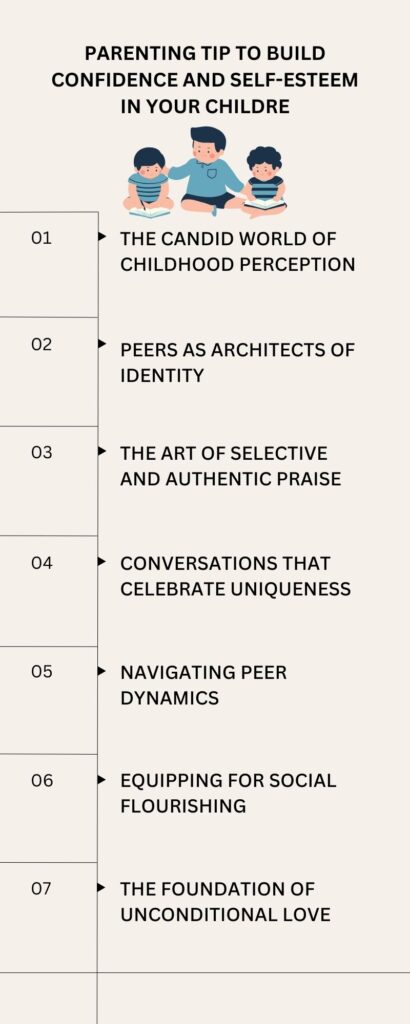Parenting is a complex journey with many changes that affect both children and their caregivers. From baby-proofing to emotional safety, the path is constantly evolving. As children grow, the challenges become less about physical dangers and more about emotional development. Fostering confidence and self-esteem in our children is a rewarding but difficult task.

The Candid World of Childhood Perception
In the fascinating realm of childhood perception, a captivating transformation occurs around the age of five. At this juncture, children become renowned for their impeccable honesty, a quality that often momentarily stuns adults. This unfiltered authenticity manifests in unabashed staring, eager pointing, and spontaneous candid comments, highlighting the true lens through which children interpret the world. This unbridled scene gives a glimpse of an unknown landscape of untainted innocence, free from social norms.
Although these candid comments may sometimes cause discomfort, it is important to recognize that the intention behind them is never malicious. Children, in their pure innocence, emerge as spontaneous narrators of their experiences, offering a narrative free from the constraints of social expectations. Their reflections serve as a vivid testament to a world seen through the crystal-clear lens of pure curiosity, providing a refreshing and unique perspective that transcends the boundaries of traditional adult understanding.
Peers as Architects of Identity
During the transition from childhood to adolescence, the influence of peers on one’s identity intensifies significantly. What was once mere casual interaction now becomes a powerful force shaping an individual’s self-perception. As adolescents navigate this critical phase, the comments and observations of their peers hold newfound significance, contributing to the molding of their self-concept.
These remarks, seemingly innocuous on the surface, possess the potential to instigate profound transformations within a child’s psyche. The delicate balance between embracing one’s uniqueness and seeking acceptance within the peer group becomes a pivotal aspect of this developmental stage. The spotlight is cast on distinctive habits and traits, with classmates and friends becoming inadvertent architects of identity. The challenge lies in fostering confidence and self-esteem while navigating the intricate dynamics of peer relationships. This juncture represents an opportunity for adolescents to define and refine their sense of self, ultimately influencing their journey toward a balanced and harmonious integration of individuality and social acceptance. Check here best stroller 2024
The Art of Selective and Authentic Praise
Central to fostering a healthy sense of self-esteem is the delicate practice of offering praise. Yet, this goes beyond mere generic commendation; it requires a nuanced recognition of particular traits and behaviors. Parents play a crucial role in instilling a profound sense of pride that surpasses superficial compliments. This is achieved by celebrating moments of imaginative brilliance or resilience, creating a tapestry of acknowledgment that contributes to a robust self-perception.
The key lies in the frequency and authenticity of this acknowledgment. Consistent and genuine praise serves as the bedrock upon which an individual’s self-worth is built. By consistently recognizing and celebrating specific achievements, parents lay the groundwork for a child’s understanding of their unique capabilities. In doing so, they contribute to the development of a resilient and confident individual who recognizes their strengths and navigates the world with a positive self-image.
Conversations That Celebrate Uniqueness
The process of recognizing distinctions and shared traits unfolds hand in hand with the developmental journey. Engaging in discussions about individual uniqueness becomes a crucial avenue for embracing diversity and fostering a sense of normalcy around individuality. By prompting children to articulate and appreciate what makes them distinct, we contribute to the robust construction of their self-concept.
Within the nurturing environment of familial bonds, these conversations act as a loom, intricately weaving a tapestry of positivity. This tapestry serves as a backdrop against which children can confidently paint the canvas of their self-esteem. The emphasis on acknowledging differences not only cultivates a richer understanding of oneself but also instills a profound respect for diversity. In this intricate dance between self-discovery and acceptance of others, children are equipped with the tools to navigate the intricate landscape of their identities, fostering a foundation for healthy self-esteem and harmonious relationships.
Navigating Peer Dynamics
As a child ventures beyond the familiar boundaries of home, the role of parental involvement undergoes a transformative shift. Parents now find themselves keenly attuned to the dynamics of peer interactions, assuming the role of vigilant guides in their child’s social journey. The emphasis lies in maintaining an open line of communication, fostering a space where the child feels comfortable sharing their experiences.
In this evolving phase, parents collaborate with teachers to gain a deeper understanding of their child’s social landscape. Through proactive discussions, valuable insights emerge, aiding parents in navigating potential challenges their child may encounter. The goal is to equip children with a robust support system, empowering them to make choices that align with their authentic selves while remaining cognizant of behavioral cues.
This holistic approach not only nurtures a child’s social development but also strengthens the foundation for positive relationships. By blending observation, dialogue, and collaboration, parents play a pivotal role in shaping a supportive environment where their children can confidently navigate the intricacies of social interactions.
Equipping for Social Flourishing
As children grow, navigating the intricate web of social norms becomes a vital aspect of their development. While instilling self-love remains a cornerstone, it is equally important to recognize and address the complexities of societal expectations. Parents play a pivotal role in guiding their children through this intricate landscape, preparing them for the potential need for behavioral adjustments.
Parenting extends beyond the confines of the home; it serves as a compass for children as they venture into the multifaceted world of social interactions. The resilience and self-esteem cultivated within the family environment act as invaluable tools, empowering youngsters to adeptly navigate the diverse currents of social dynamics.
By fostering a foundation of emotional strength and self-worth, parents contribute to their children’s ability to not only understand but also engage constructively with the societal norms they encounter. This holistic approach to parenting not only prepares children for the complexities of the external world but also ensures that they carry a robust sense of self into their social interactions.
The Foundation of Unconditional Love
Within the complex landscape of parenting, a foundational element persists as the bedrock: unconditional love. This unwavering emotion serves as a powerful force, equipping children to navigate the intricate challenges of peer acceptance. The assurance that they are cherished in entirety, quirks and all, becomes a resilient pillar uplifting their self-worth. This profound form of love extends beyond the boundaries set by societal expectations, imprinting a lasting impact on their odyssey of self-discovery.
In the intricate tapestry of familial relationships, unconditional love emerges as the thread that binds parent and child, fostering an environment where authenticity is not just accepted but celebrated. It forms the cornerstone upon which a child’s resilience and sense of identity are built. As they encounter the complexities of peer interactions, armed with the knowledge that their worth is not contingent on conformity, children are emboldened to face the world with confidence. This enduring love becomes a guiding light, illuminating the path toward a profound understanding of oneself amid the myriad challenges of growth and social integration.
Related: Selecting the Ideal Graco Stroller: A Guide to Finding the Perfect Fit for Your Family
Final Words
In the mosaic of parenthood, fostering self-esteem emerges as a masterpiece woven with conversation, support, and resilience. The emotion of genuine love and targeted commendation serve as shields against the emotional pitfalls of growing up. This symphony of guidance and care fortifies children to embrace their uniqueness, forging an unbreakable connection with themselves as they navigate the labyrinth of their evolving identities. Through this artful journey, confidence blooms, and self-esteem thrives.




